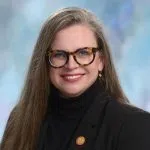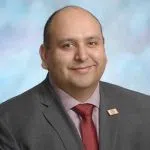Senate Minority Leader Senator Liz Larson of Sioux Falls reacts to South Dakota Governor Kristi Noem’s proposed (Dec. 3, 2024) fiscal year 2026 budget:

Courtesy photo.
“While I share a commitment with Gov. Noem to balance the state’s budget, we must also ensure we are prioritizing the challenges that many South Dakotans face. The Democratic caucus is committed to investing in our public schools and lowering costs for South Dakotans – this includes access to affordable childcare, housing and medical care.
Under those two goals, there’s a few things South Dakotans should consider:
The proposed 1.25% increase for healthcare providers, schools, and state employees is insufficient to keep pace with inflation and workforce demands. We must do more to support those who care for our communities.
Public school stakeholders have expressed concerns about voucher programs. We must carefully consider how the Governor’s proposed Education Savings Accounts (ESA) program could divert critical public resources away from public schools.
The Governor proposes $71.9 million in budget reductions and discretionary spending changes. It is essential to examine these proposed cuts closely, particularly those affecting the Department of Health and Human Services and Temporary Assistance for Needy Families (TANF). These programs are critical for South Dakota families, especially during a time of declining purchasing power.
We agree that the state penitentiary is in dire need of replacement. Inmates and Department of Corrections staff are not currently operating in safe conditions. However, we urge greater emphasis on rehabilitation, alternatives to incarceration, and a more comprehensive assessment of what facilities are “right-sized” for South Dakota.
While mentioned briefly, the Governor’s address also missed some critical issues, such as the childcare crisis, the lack of affordable housing, and the expansion of accessible medical care. There was also no mention of climate mitigation, energy transitions, or renewable energy investments. The important relationship with Tribal Nations was also notably absent.
I recognize the challenges Governor Noem’s team faced in crafting this budget during leaner financial times. South Dakota’s diversity and complexity require thoughtful, nuanced approaches. We commend the Governor’s focus on mental health care, cybersecurity investments, enhanced school safety, and responsible spending.
This budget is the beginning of an important conversation that will unfold throughout the legislative session. The Democratic Caucus looks forward to working with our colleagues on shared goals while advocating for a budget that truly invests in the potential of all South Dakotans.”
House Assistant Minority Leader Representative Eric Emery of Rosebud reacts to South Dakota Governor Kristi Noem’s proposed (Dec. 3, 2024) fiscal year 2026 budget:

Courtesy photo.
“While I understand the efforts of Gov. Kristi Noem to balance the budget and invest in key areas, there are still gaps in systemic inequities and Tribal community needs. The focus on low taxes and business growth overlooks the economic challenges that rural and Tribal areas face every day. Broadband investments are helpful, but reservations and underserved communities must be prioritized. It is essential to partner with Tribal leaders to create tailored economic strategies.
I am also concerned with the Governor’s proposed Education Savings Accounts. This program could divert resources from public schools, which are vital for rural and Tribal areas. More support is needed for culturally relevant education, Native language preservation, and Tribal public schools.
While healthcare investments, including Medicaid expansion, are positive, they don’t fully address Tribal health disparities. Chronic underfunding of Indian Health Service (IHS) facilities and limited mental health resources need urgent attention. Collaborative healthcare programs with Tribal partners can improve outcomes. It is also critical that we improve reservation water quality.
We must prioritize the crisis of Missing or Murdered Indigenous Persons (MMIP) by partnering with Tribal law enforcement. When it comes to new prison facilities, we need to make sure we are also tackling root causes like poverty, mental health, and substance abuse. Rehabilitation programs tailored to Native populations are vital to reduce recidivism.
While this budget builds South Dakota’s economy and infrastructure, it misses opportunities to promote fairness for Tribal nations and underserved communities. A truly inclusive budget should address inequalities and ensure all South Dakotans can succeed.”








Comments